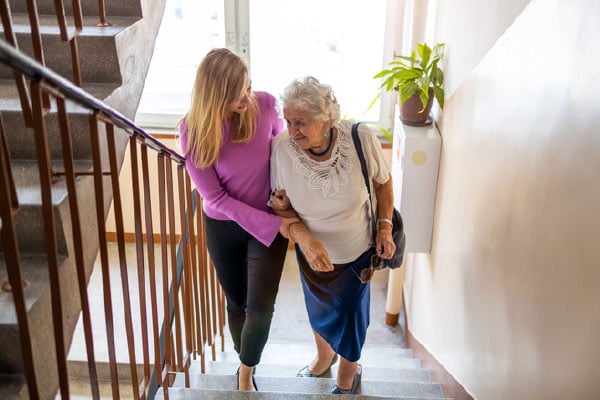The holidays are officially upon us. This year, after so much time apart during the pandemic, many of us are excited to celebrate the season by visiting with friends and family once again. For families with elderly loved ones, this time of year is important, not only as a time to reconnect, but as an opportunity to check in on health, mobility, and how older relatives are getting along at home.
If you're visiting in person this holiday season, it's an ideal time to evaluate the fall risk of older adults both inside and outside of the house. Particularly if you haven't seen aging parents or older relatives in person due to the pandemic, there may be changes in the condition of the home or in the overall health and cognitive state of a loved one, that may make a fall more likely.
These tips, from the care experts at American, Advocate and Whitsyms In-Home Care, can give you an idea of what to look for and how to make a senior loved one’s environment safe:
- Monitor overall physical health and mobility. In addition to playing a part in a person’s overall health, chronic illnesses can also impact physical health, including balance and mobility. Pay attention to how elderly loved ones walk. Do you notice shuffling? Can they get up from a seated position without assistance? Do they have any illnesses that might increase the risk of falls? The following are some conditions that may impact an older adult’s balance and mobility:
- Vision impairment or loss
- Arthritis or other bone and joint conditions
- Chronic pain
- Diabetes
- Hypertension
- Parkinson’s disease
- Anemia or other blood disorders
- Thyroid issues
- Foot problems
- Muscle weakness, particularly in the legs
- Vertigo or dizziness
- Cognitive or mood disorders, like dementia, depression, etc.
- Urinary incontinence
- Discuss current medications being taken. Certain prescription and over-the-counter medications increase a person’s risk of falling. These include pain medications, sedatives, insulin, antidepressants, antipsychotics, and sleeping pills. Diuretics and blood pressure drugs may also lower blood pressure which can create a fall risk as well. Some drugs have side effects such as dizziness or confusion which can create fall hazards in older loved ones, too. Drinking alcohol or using marijuana while taking medications can increase this risk as well. Help your loved one make a list of which medications he or she is taking and discuss with his or her physician any concerns about fall risk associated with these drugs.
- Ask about exercise. For many older adults with chronic conditions, exercise can be challenging. Regular exercise, however, is essential to ensure muscles stay strong, which improves balance and decreases the chance of falling. Talk to your family member and ask how much exercise he or she gets daily. With the help of a doctor, develop an exercise plan that is safe, fun, and easy to keep up with.
- Survey the home environment. There are many factors in the home that create fall hazards, including:
- Slippery footwear, like socks or shoes without treads or any footwear that is too big or small or uncomfortable
- Loose carpets, electrical cords, clutter, dark stairways, etc.
- Outdoor risks like uneven ground, stairs or porches without secure railings
- Lack of walking aids such as canes or walkers
When it comes to fall prevention, creating a safe home environment is key. For more helpful tips on how to reduce the risk of falls for older adults, contact the Florida senior care experts at American, Advocate, and Whitsyms In-Home Care. We can refer a care professional to help older adults in a wide variety of ways, including:
- Range of motion assistance
- Assistance with light housekeeping, laundry and linen changes
- Transferring and positioning
- Walking with accompaniment
- Going to the restroom
- Diabetes care
- Medication assistance
- Companionship and encouragement for physician-approved exercise programs
- And so much more!
Contact us today at the location nearest you and let us help find the perfect care provider to meet your in-home care needs.
- American In-Home Care – Serving North, Central, and West Coast of Florida
- Advocate In-Home Care – Serving Southeast and Southwest Florida
- Whitsyms In-Home Care – Serving Southeast and Southwest Florida
State of Florida License and Registration Numbers: 30211518, 30211651, 30211295, 30211390, 30210978, 30211293, 30211382, 30211504, 30211733, 30211535, 30211531, 30211710, 30211709, 30211045, 5661


